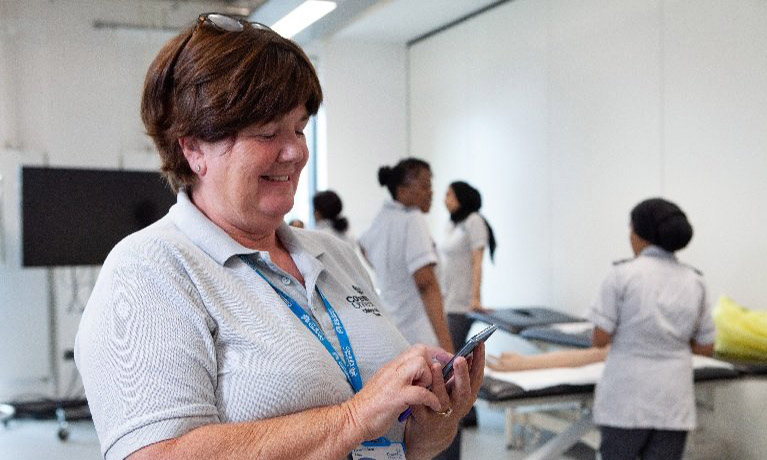Search
Coventry University home of UK’s first ‘Standalone’ 5G network thanks to Vodafone partnership

Coventry University lecturer Jane Rudge with the UK'sfirst standalone 5G device
Friday 03 July 2020
Press contact
Coventry University is the home of the UK’s first ‘Standalone’ 5G network thanks to a partnership with operator Vodafone.
The network is the next phase in 5G technology and has been installed in the Alison Gingell building on the university’s Coventry city centre campus. It will support the trial of state-of-the-art virtual reality learning technologies to train student nurses and allied health professionals in the university’s school of Health and Life Sciences.
It is the first step in Coventry University’s plans for a 5G campus and continues its ambitions to provide students with innovative and flexible teaching and learning.
Vodafone is the first operator to showcase a ‘Standalone’ 5G network in the UK and says it will show the true benefits of 5G, including ultra-low latency, guaranteed speed performance, and the Internet of Things on a never-before-seen scale. The operator first switched on 5G in the UK one year ago today (July 3).
We are always looking to improve and develop the teaching and learning experience for our students and staff. Working with Vodafone to house the UK’s first standalone 5G network will help us continue to innovate and enhance the way students learn. Matching the latest technology with our TEF Gold-Standard teaching provides the best experience we can for our students.
Professor John Latham CBE, Coventry University Vice-Chancellor
Being the first university in the UK to have this next phase of 5G technology is the first step on our journey to creating a 5G campus and we will soon be able to reveal the exciting ways in which we will use this technology to maximise the potential of virtual reality teaching for our Health and Life Sciences students.
To further support the university’s 5G ambitions, Vodafone has also installed Ericsson’s 5G Radio Dot System in the university’s Disruptive Media Learning Lab and National Transport Design Centre. The indoor technology will deliver fast, high capacity 5G in key buildings to support its innovative teaching and learning.
This is a landmark in our 5G journey, just one year on from launch. 5G today is all about capacity and increased speeds. It’s giving people the best mobile experience ever, but it’s only the tip of the iceberg of what 5G can do. With this new live network we’re demonstrating the future potential of 5G and how it will be so valuable to the UK economy. This new phase of 5G starts to deliver on the incredible capabilities of 5G that have had so much attention, but haven’t yet been brought to life. From here, we will really start to see 5G make a difference to the way organisations think about being connected, and what’s possible with connectivity.
Scott Petty, Vodafone UK’s Chief Technology Officer
When a customer connects to 5G today, they are using a mix of 4G and 5G together. This is just the first phase of 5G, and its main benefit is adding more capacity to the network, which means faster speeds and a more reliable connection.
This next phase of 5G is totally independent from 4G, that’s why it’s called ‘Standalone’ – and it opens up far more possibilities to revolutionise how consumers and businesses will connect.
To deliver the UK’s first Standalone 5G network at Coventry University, Vodafone has teamed up with Ericsson, MediaTek, OPPO and Qualcomm - four technology leaders at the cutting edge of 5G development.
One year ago, on 3 July 2019, Vodafone switched on 5G in seven UK cities. Since launch, Vodafone has added 5G to 37 more places and massively expanded coverage in launch cities. Vodafone has also built 5G in 70 locations across Ireland, Italy, Germany and Spain, and is the only UK operator to offer 5G access when customers are roaming abroad.




